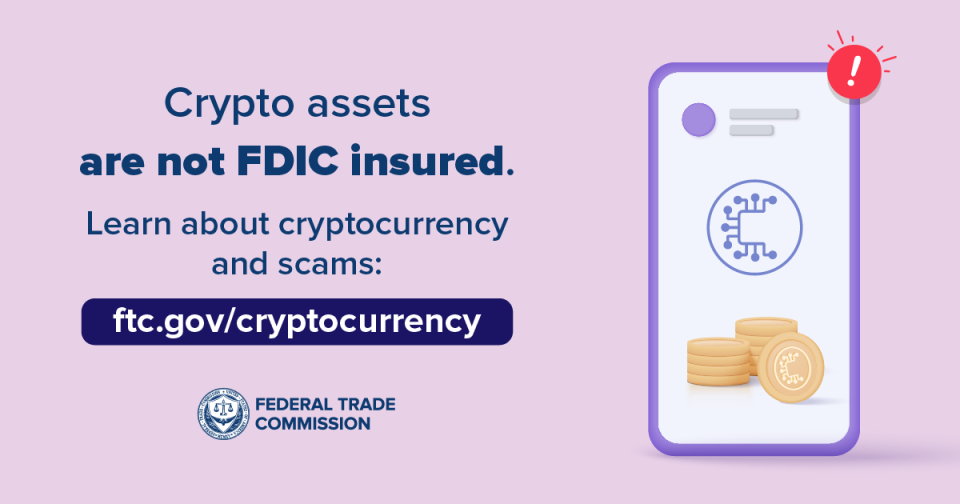If your bank is FDIC insured, you’re protected up to $250,000 if the bank fails. But what about the funds you deposit with a crypto-based financial services provider? Nope. That money isn’t FDIC insured or protected if the crypto company goes under. But that’s exactly what one crypto company promised.
According to the FTC, Voyager Digital LLC, a crypto-based financial services provider, misled people with claims that money deposited through a “Voyager App” was FDIC insured if anything went wrong. The FTC says that Voyager advertised itself as a safe and secure bank alternative for people to store money. Voyager’s messaging also encouraged people to “ditch” their regular bank and use Voyager’s debit card instead.
Despite its claims, Voyager was never an FDIC insured bank. And FDIC insurance doesn’t cover crypto (also called crypto assets.) So, when Voyager eventually failed and filed for bankruptcy, people with accounts were locked out and lost money.
In a proposed settlement announced today, the Voyager and its affiliated companies have agreed to be permanently banned from offering, marketing, or promoting any products or service that could be used to deposit, exchange, invest, or withdraw any assets.
Protect yourself from crypto-related scams
- Know that crypto deposits are not FDIC insured, period. If something happens, the government may not have an obligation to step in and help get your money back.
- Research the crypto company. Search online for the company name, plus “review,” “scam,” or “complaint” to see what people say.
- Don’t trust companies that make big promises or guarantees. Only scammers promise “no risk,” guarantee high returns, or promise “safe” places to deposit your money.
Check out ftc.gov/cryptocurrency to learn more. Spot a crypto fraud or scam? Tell us at ReportFraud.ftc.gov.


Thank you for the heads up on the lies promulgated by untrustworthy crypto companies.
I try to be extra careful online with Crypto, Bitcoin, or anything like that. You can tell if it's a scam because they press you and try to make you indulge in their nonsense.
good to know about crypto Insurance , thanks for the warning !!!!!
Hi Cristina
thank you for bring awareness to such topics. Spreading awareness is the best form of prevention when it comes to these scams.
Unfortunately my friend was scammed in crypto and you might be able to help. I'm trying to find someone who can maybe help my friend's case. Any chance you can open up the comment section in one of your previous alerts??
The alert on Nov. 16 2022 about crypto recovery scams
In reply to Hi Cristina thank you for… by Maud
The 2022 blog comments are closed now. Read the article about cryptocurrency at www.ftc.gov/cryptocurrency to learn about different scams and how to report scams. Read about what to do if you paid a scammer at
www.consumer.ftc.gov/articles/what-do-if-you-were-scammed.